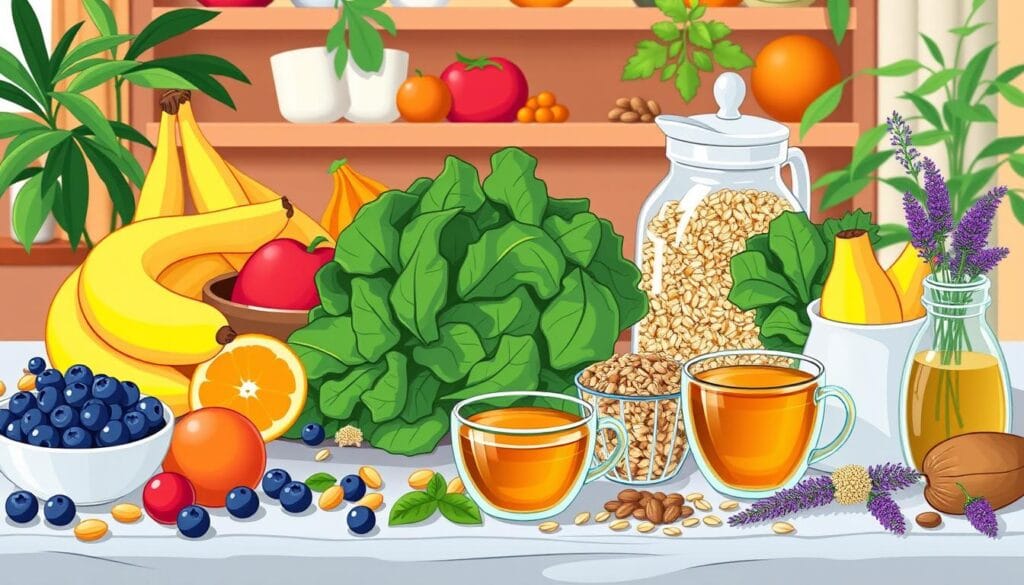Welcoming a new life is a joy, but it can also bring big challenges for new moms. Postpartum depression affects up to one in seven women, casting a shadow on this special time. But, there’s hope, and natural remedies offer a promising way forward. We’ll look at herbal treatments, mindfulness, and holistic care for postpartum depression, with Dr. Chandril Chugh’s guidance.
Postpartum depression can feel overwhelming, but you’re not alone. This article will help you understand postpartum depression and its causes. You’ll learn about natural remedies like adaptogenic herbs and mindfulness practices. These are safe, effective, and holistic ways to support your mental health after giving birth.
Table of Contents
ToggleUnderstanding Postpartum Depression
Postpartum depression is a serious mood disorder that affects new mothers after childbirth. It brings feelings of sadness, anxiety, and fatigue. These feelings can make it hard for a woman to take care of herself and her baby. Knowing about definition and symptoms of postpartum depression, and its causes and risk factors, is key to getting help.
Definition and Symptoms
Postpartum depression is a type of clinical depression that happens after childbirth. It affects about 15% of women. Symptoms include feeling sad all the time, feeling hopeless, and trouble bonding with the baby.
Other signs are changes in appetite and sleep, and feeling very tired or unmotivated.
Causes and Risk Factors
The causes of postpartum depression are complex. Hormonal changes, psychological factors, and social issues all play a part. Hormonal shifts during and after pregnancy are a big factor.
Other risk factors include a history of mental health issues, lack of support, stress, and poor sleep and diet.
Some important risk factors for postpartum depression are:
- Personal or family history of depression or other mental health conditions
- Stressful life events during pregnancy or after childbirth
- Lack of social support from family and friends
- Complications during pregnancy or delivery
- Preexisting medical conditions, such as thyroid disorders
- Substance abuse or dependence
Understanding definition, symptoms, causes, and risk factors of postpartum depression helps. It lets new mothers and their loved ones spot the signs early. This way, they can get the support and treatment they need.
Benefits of Breastfeeding for Postpartum Depression
If you’re dealing with postpartum depression, breastfeeding might help. Studies show women who only breastfeed have an 89% lower risk of depression. It releases oxytocin, a hormone that calms you and boosts your mood.
Postpartum depression hits about 1 in 7 new moms. Lack of omega-3s and Vitamin B-2 can increase your risk. But breastfeeding can help with these issues and support your mental health.
Breastfeeding also has physical benefits for your recovery. It helps your uterus shrink back, cuts down on bleeding, and might lower cancer risk later. It’s a strong tool against postpartum depression.

If postpartum depression is overwhelming, get help. Talk to your doctor about adding breastfeeding to your treatment. With the right care, you can beat this and enjoy your baby’s early days.
Herbal Remedies for Postpartum Depression
If you’re dealing with postpartum depression, natural herbal remedies might help. Certain herbs and plants can ease symptoms. Let’s look at some promising options.
Adaptogenic Herbs
Herbs like ashwagandha and rhodiola help your body handle stress. They can also help manage postpartum depression. These herbs aim to balance your body and improve your mood after giving birth.
St. John’s Wort
St. John’s Wort is known as a natural mood booster. It can help with postpartum depression by lifting your mood and easing anxiety. But, talk to a doctor first because it can affect other medicines.
While herbal remedies can be useful, always talk to your doctor. They can help create a plan that’s right for you. Combining natural and medical treatments might be the best way to fight postpartum depression.
Mindfulness and Relaxation Techniques
Adding mindfulness and relaxation to your daily life can really help with postpartum depression. It helps you stay in the moment and forget worries. This can make you feel less stressed and anxious, helping you sleep better and feel happier.
Practices like mindfulness meditation, yoga, and deep breathing can calm your body. They make you feel more relaxed and happy.
Mindfulness Meditation
Mindfulness meditation is about being in the now, without judgment. It helps you stop thinking about worries that come with postpartum depression. Studies show it can really help, with up to 85% of people feeling better.
Yoga and Deep Breathing
Doing yoga and deep breathing every day can also help. They help your body relax, making you feel less stressed and anxious. Research says these activities can lower the risk of depression by 25% during and after pregnancy.

By using mindfulness, meditation, yoga, and deep breathing, you can manage postpartum depression better. These natural methods are great for improving your mood and well-being. They are powerful tools on your path to recovery.
Postpartum depression herbal treatment
If you’re dealing with postpartum depression, you’re not alone. Herbal remedies can help manage your symptoms. They support your mental health during this tough time. By using adaptogenic herbs, mood-boosting plants, and relaxation techniques, you can find natural ways to feel better.
Adaptogenic herbs like ashwagandha and rhodiola help your body handle stress. St. John’s Wort is used to treat mild to moderate depression. Omega-3 fatty acids from fish oil and vitamin D can also help with postpartum mood disorders.
- Ashwagandha and rhodiola: Adaptogenic herbs that help the body manage stress
- St. John’s Wort: Traditional herb used to treat mild to moderate depression
- Omega-3 fatty acids: Help prevent and treat postpartum mood disorders
- Vitamin D: Can be a beneficial supplement for postpartum depression
Mindfulness practices like meditation and deep breathing can calm your mind. Aromatherapy with scents like lavender and citrus can also improve your mood.
Always talk to a healthcare provider before trying new herbal or supplement treatments. This is especially true if you’re already taking medications. With a holistic approach, you can find natural remedies that meet your needs. This will help you on your journey to postpartum wellness.
Dietary Changes for Postpartum Depression
Postpartum depression can be tough, but diet changes help. Cut down on caffeine and alcohol. They can mess with your sleep and mood.
Caffeine, in particular, can make you feel anxious and jittery. This can make postpartum depression worse.
Eating sleep-promoting foods is also good. Foods with melatonin, magnesium, and tryptophan help you sleep better. Some good foods are:
- Almonds
- Bananas
- Oats
- Fatty fish (such as salmon)
- Leafy greens
- Whole grains
These diet changes support your body and mind after having a baby. A balanced diet is key to managing postpartum depression symptoms and staying healthy.

Exercise and Physical Activity
Regular exercise can help manage postpartum depression. Activities like brisk walking, cycling, or swimming can reduce anxiety and improve mood. This leads to better sleep and overall well-being.
Yoga and deep breathing are also good for new moms. These practices help reduce stress and promote relaxation. Starting slowly and getting a healthcare provider’s advice is key.
The benefits of exercise for postpartum depression are clear. Studies show it can be as good as medicine or therapy for depression. Exercise programs have also helped reduce depression in many women, including those in Taiwan.
If you’re dealing with postpartum depression, try these exercises:
- Brisk walking or jogging
- Swimming or water aerobics
- Gentle yoga or Pilates
- Strength training exercises
- Pelvic floor therapy
Start slow and listen to your body. With your healthcare provider’s help, you can do more and more. Regular exercise is a strong tool for postpartum wellness.
Importance of Support System
Having a strong support system is key when dealing with postpartum depression. Family, friends, and community connections offer emotional, practical, and social support. This is crucial for new mothers to get through tough times.
Studies show that more support means lower depression scores. A recent study found that less social support during COVID-19 increased depression and anxiety in new moms. It also hurt parent-infant bonding.
Support groups or counseling are great for moms with postpartum depression. They offer a safe place to talk, share, and get advice from experts and others who understand.
You don’t have to face this alone. Asking for help and staying connected can really help your recovery. Don’t be afraid to ask for help and seek professional advice when you need it.

Integrating Herbal and Conventional Treatments
Managing postpartum depression can be done by mixing herbal remedies with traditional treatments. This way, we tackle the condition from all sides. It helps with both the body and mind.
It’s important to work with a healthcare provider for this approach. They can figure out the right mix of treatments for you. This ensures everything works well together.
Research shows that some Chinese herbs can help when used with therapy or medicine. This mix can make symptoms of depression better and improve your overall health.
Choosing a mix of herbal and traditional treatments is a big step towards getting better. It lets you find what works best for you. This approach helps you regain your health in a personal way.
Conclusion
Postpartum depression is common and can be treated. There are many natural remedies for postpartum depression to help new moms. These include adaptogenic herbs, mindfulness, diet changes, and a strong support system.
It’s key to remember that seeking help for postpartum depression is vital. A mix of natural and medical treatments works best. With the right support, you can enjoy motherhood more.
You’re not alone in this journey. Exploring natural remedies can help you feel better. It’s a big step towards happiness and fulfillment as a new mom.
FAQ
What are the key benefits of breastfeeding for postpartum depression?
Breastfeeding can help with postpartum depression. Studies show women who only breastfed had 89% less chance of getting it. It releases oxytocin, which calms the mind and lifts the mood.
What are some effective herbal remedies for managing postpartum depression?
Some herbs can help with postpartum depression. Adaptogens like ashwagandha and rhodiola help the body handle stress. St. John’s Wort is also used to help with depression.
How can mindfulness and relaxation techniques help with postpartum depression?
Mindfulness and relaxation can help with postpartum depression. Mindfulness meditation reduces stress and improves sleep and mood. Yoga and deep breathing also help by calming the body.
What dietary changes can be beneficial for managing postpartum depression?
Eating right can help with postpartum depression. Avoid caffeine and alcohol to improve sleep. Foods that help sleep, like melatonin, are good too.
How can regular exercise and physical activity impact postpartum depression?
Exercise is good for postpartum depression. Activities like yoga and deep breathing reduce anxiety and improve mood. Start slow and talk to a doctor before starting.
Why is having a strong support system crucial for managing postpartum depression?
A strong support system is key for managing postpartum depression. Family and friends offer emotional and practical help. Support groups and counseling also help.
How can an integrative approach combining herbal and conventional treatments be effective for postpartum depression?
Combining herbal remedies with conventional treatments can be effective. Work with a healthcare provider to find the right mix. It’s complex but can be very helpful.
Source Links
- 5 Effective Strategies For Sleep Maintenance Insomnia Relief
- Meghan Cliffel on LinkedIn: #maternalmentalhealth #postpartumpsychosis #mentalhealth #paidleave… | 21 comments
- Treating postpartum depression with complementary or alternative medicine | Your Pregnancy Matters | UT Southwestern Medical Center
- Postpartum Depression – StatPearls – NCBI Bookshelf
- Breastfeeding and Postpartum Depression: An Overview and Methodological Recommendations for Future Research
About The Author

Medically reviewed by Dr. Chandril Chugh, MD, DM (Neurology)
Board-Certified Neurologist
Dr. Chandril Chugh is a U.S.-trained, board-certified neurologist with expertise in diagnosing and managing neurological disorders, including migraines, epilepsy, Parkinson’s disease, and movement disorders. His clinical focus includes evidence-based neurological care and patient education.
All content is reviewed for medical accuracy and aligned with current neurological guidelines.




